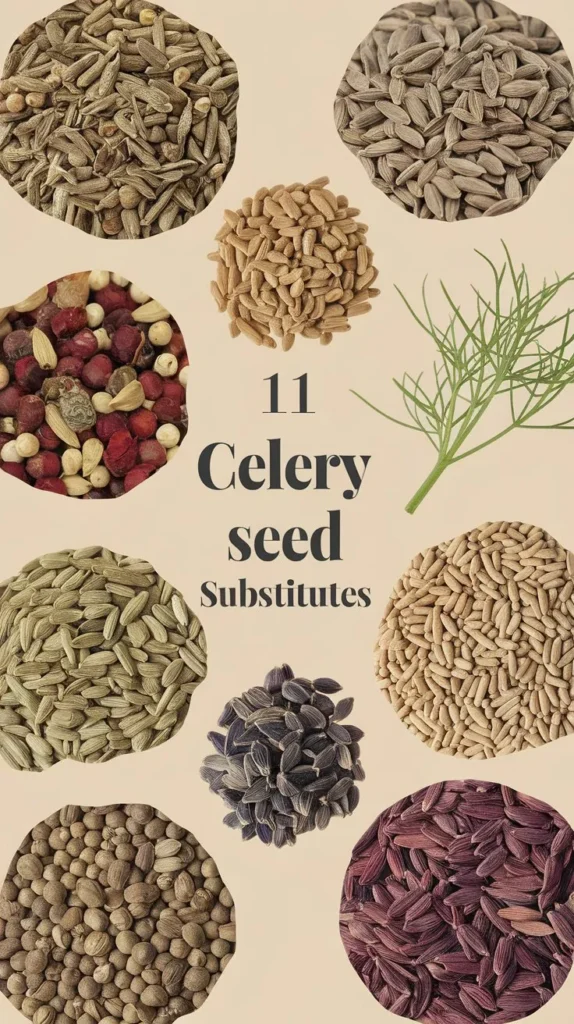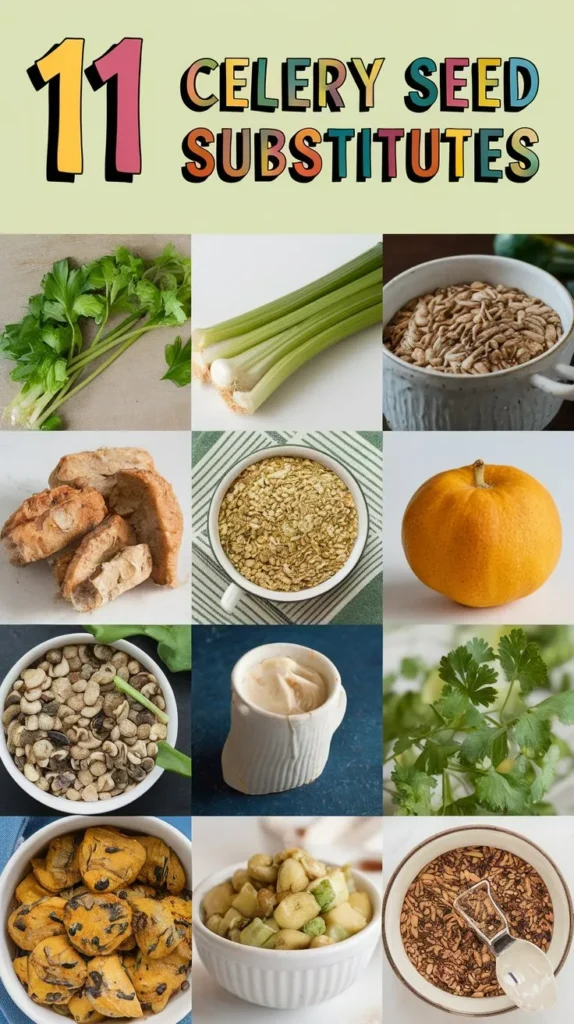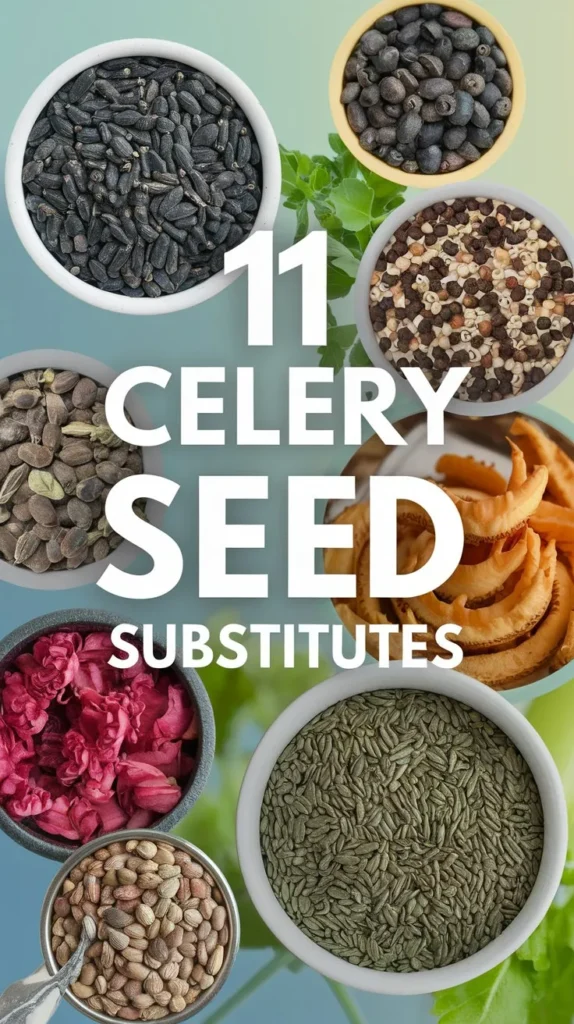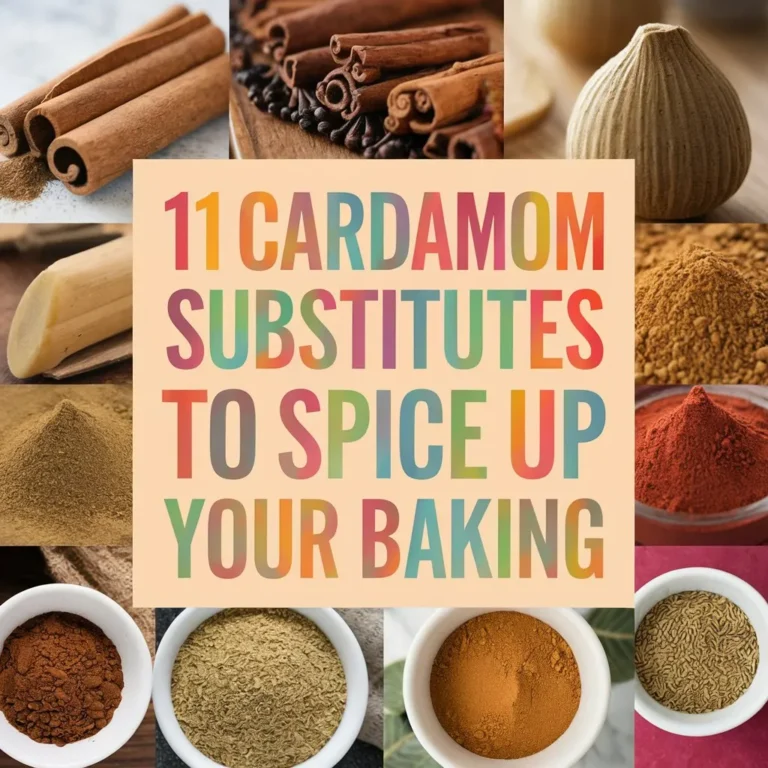11 Celery Seed Substitutes for a Fresh Twist on Classic Recipes
You’re no stranger to the warm, slightly bitter flavor celery seeds bring to your favorite recipes. But what if you could shake things up and add a fresh spin to those classic dishes?
From the familiar herbal notes of lovage to the pungent kick of radish seeds, there are a multitude of alternatives waiting to be explored.
As you start experimenting with these 11 celery seed substitutes, you’ll discover that each one reveals a new dimension of flavor, begging the question: which one will become your new go-to ingredient?
At a Glance
- Dill seed and lovage are ideal substitutes for celery seed, offering similar flavor profiles and aromas.
- Caraway seeds, fennel seeds, and nigella seeds provide unique flavor profiles, adding depth and complexity to recipes.
- Fresh parsley and sesame seeds bring bright, fresh flavors to dishes, making them suitable substitutes in certain recipes.
- Mustard seeds and paprika offer smoky, pungent flavors, ideal for adding depth to recipes without celery seeds.
- When substituting, start with a small amount and adjust to taste, as flavors can vary significantly between seeds.
Dill Seed: The Closest Relative
One of the most suitable alternatives to celery seed is dill seed, which shares a similar flavor profile and aroma.
You’ll find that dill seed varieties, such as Mammoth or Bouquet, offer a fresh, bright flavor that complements a range of dishes. When substituting dill seed for celery seed, keep in mind that dill has a slightly sweeter and more delicate taste.
When using dill seed, you’ll want to store it properly to maintain its flavor and aroma. Dill seed storage is vital to preserve its potency.
Store dill seeds in an airtight container, away from direct sunlight and heat sources. This will guarantee you can enjoy the full flavor of dill seeds for a longer period.
In recipes, you can use dill seed as a 1:1 substitute for celery seed. However, start with a small amount and adjust to taste, as dill seed can be quite potent.
With its unique flavor and aroma, dill seed is an excellent addition to many recipes, from pickling and sauces to soups and stews.
Caraway Seeds for a Nutty Flavor
While dill seed is an excellent substitute for celery seed, you may want to explore other options to add depth and variety to your recipes.
Caraway seeds, with their nutty, slightly bitter flavor, can bring a unique twist to your dishes.
One of the caraway seed benefits is that it pairs well with a variety of ingredients, including:
- Sweet potatoes, which complement the earthy flavor of caraway seeds
- Sauerkraut, where the seeds enhance the tangy, fermented taste
- Rye bread, where the caraway seeds add a distinctive flavor and aroma
When using caraway seeds as a celery seed substitute, start with a small amount, as they can be quite potent.
Caraway seed pairing is also essential, as it can either complement or clash with other flavors.
Experiment with different combinations to find the perfect balance for your taste buds.
With caraway seeds, you’ll discover a new dimension in flavor that will elevate your recipes and make them stand out.
Fresh Parsley for a Bright Taste
You can add a fresh twist to your recipes by substituting celery seed with fresh parsley, which brings a bright, green flavor to the table.
This herb is a great addition to many dishes, from soups to salads, and can even be used as a fresh garnish option to add a pop of color and flavor.
To incorporate parsley into your cooking, try using it in infusion methods like making a parsley oil or adding it to a bouquet garni.
You can also chop it finely and mix it into sauces, marinades, or dressings for an added depth of flavor.
When substituting parsley for celery seed, use about three times the amount of fresh parsley as you’d celery seed, as the flavor is more delicate.
With its fresh, green taste, parsley is a great way to add a new dimension to your classic recipes.
Fennel Seeds for Anise-Like Flavor
Vibrancy is added to dishes when fennel seeds are used as a celery seed substitute, bringing an anise-like flavor to the forefront.
You’ll love the unique twist this substitute adds to your favorite recipes. Fennel seeds have a rich history, dating back to ancient Greece and Rome, where they were used to aid digestion and freshen breath.
When using fennel seeds as a celery seed substitute, you can expect:
- A sweet, anise-like flavor profile that pairs perfectly with fish, meat, and vegetables
- A delicate crunch that adds texture to salads, soups, and sauces
- A subtle licorice flavor that complements herbs like parsley, dill, and basil
With fennel seeds, you’ll discover a flavor that’s both familiar and exotic, making them an excellent addition to your spice rack.
Lovage for a Similar Herbal Note
Lovage’s tall, stately stalks and large, dark green leaves evoke a sense of stateliness, making it a fitting substitute for celery seeds.
You’ll find that lovage shares a similar herbal note with celery, making it an excellent addition to soups, stews, and salads.
This versatile herb has been used for centuries for its medicinal properties, including reducing inflammation and improving digestion.
You can also reap the benefits of lovage by brewing a soothing tea, which has been known to calm anxiety and promote relaxation.
Lovage tea benefits extend to its ability to alleviate menstrual cramps and reduce blood pressure.
When substituting lovage for celery seeds, use the leaves or stems in a 1:1 ratio.
You can also use lovage essential oil, but start with a small amount as it can be quite potent.
With its subtle, slightly bitter flavor, lovage will add depth and complexity to your dishes without overpowering them.
Experiment with lovage in your favorite recipes to experience its unique flavor and medicinal benefits.
Mustard Seeds for a Pungent Kick
Moving beyond the herbal notes of lovage, a pungent and flavorful alternative to celery seeds awaits in the form of mustard seeds.
You may be surprised to learn that mustard seeds can add a similar depth to your dishes, with a slightly spicy kick. As you explore the world of mustard seeds, you’ll discover a plethora of benefits and varieties to choose from.
Mustard seeds offer several advantages over traditional celery seeds.
Some of the key benefits include:
- Increased nutrition: Mustard seeds are rich in antioxidants, omega-3 fatty acids, and fiber, making them a nutritious addition to your recipes.
- Versatility: With various mustard seed varieties, such as brown, black, and white, you can experiment with different flavors and textures to find the perfect fit for your dishes.
- Easy to incorporate: Mustard seeds are simple to add to your recipes, whether you’re using them whole, ground, or as an oil.
Nigella Seeds for a Peppery Zing
With their distinctive peppery flavor and crunchy texture, nigella seeds offer a unique substitute for celery seeds in many recipes.
You’ll find that nigella seeds have a rich history, dating back to ancient times when they were used in traditional Indian and Middle Eastern cuisine. Today, they’re prized for their versatility and numerous health benefits.
One of the key Nigella benefits is their high antioxidant content, which can help protect against inflammation and oxidative stress.
They’re also rich in fiber, protein, and healthy fats, making them a nutritious addition to your dishes.
When substituting nigella seeds for celery seeds, start by using a 1:1 ratio. You’ll notice that nigella seeds have a slightly bitter, nutty flavor that pairs well with vegetables, meats, and soups.
To bring out their flavor, toast them lightly before adding them to your recipe.
With their unique flavor and crunchy texture, nigella seeds are sure to add a fresh twist to your classic recipes.
Paprika for a Smoky Depth
How do you achieve a rich, smoky depth in your dishes without celery seeds?
Paprika is an excellent substitute that can add a smoky, slightly sweet flavor to your recipes. This versatile spice is commonly used in Hungarian and Spanish cuisine, and its mild, earthy flavor makes it an excellent addition to many dishes.
With paprika, you can create:
- Smoky BBQ sauce that’s perfect for slathering on ribs or chicken
- Spicy deviled eggs that add a kick to your next party or gathering
- Hearty stews and soups that warm the soul on a chilly day
Paprika’s mild flavor makes it easy to incorporate into a variety of recipes without overpowering other ingredients.
Plus, its rich, smoky depth adds complexity to dishes without the need for celery seeds.
Whether you’re looking to add a new dimension to your favorite recipes or experiment with new flavors, paprika is an excellent choice.
Radish Seeds for a Spicy Bite
Radish seeds pack a pungent punch that can add a spicy kick to your dishes, making them an excellent substitute for celery seeds.
You’ll love the bold flavor they bring to your recipes. One of the radish seed benefits is their ability to add depth and warmth without overpowering other ingredients. Plus, they’re versatile and can be used in a variety of dishes, from soups to salads.
When choosing radish seeds, you’ll find several varieties to select from, each with its unique flavor profile.
For instance, black radish seeds have a slightly sweet and earthy flavor, while white radish seeds are milder and more delicate. You can also experiment with daikon radish seeds, which have a spicy kick similar to wasabi.
When substituting radish seeds for celery seeds, start with a small amount and adjust to taste. Radish seeds are potent, so it’s better to err on the side of caution.
With their spicy bite and versatility, radish seeds are an excellent addition to your spice rack, and they’re sure to elevate your dishes to the next level.
Sesame Seeds for a Nutty Crunch
Vibrancy is added to dishes when you substitute sesame seeds for celery seeds, bringing a nutty crunch that awakens the senses.
This swap is especially effective in Asian-inspired dishes, where sesame seeds are a staple ingredient. You’ll find that sesame seeds pair beautifully with sesame oil, adding depth and complexity to your recipes.
Some exciting ways to incorporate sesame seeds into your cooking include:
- Adding them to stir-fries for a satisfying crunch
- Using them as a topping for salads or noodle dishes
- Mixing them into homemade granola or energy bars for a nutty flavor boost
When substituting sesame seeds for celery seeds, keep in mind that sesame seeds have a stronger flavor, so start with a small amount and adjust to taste.
With their nutty flavor and crunchy texture, sesame seeds are sure to become a new favorite ingredient in your kitchen.
Wild Fennel for a Fresh Anise
What adds a fresh twist to your dishes when celery seeds are scarce? You might be surprised to find that wild fennel can be a fantastic substitute.
This fragrant herb offers a similar anise or licorice flavor profile, making it an excellent addition to various recipes.
Wild fennel uses extend beyond seasoning, though.
You can use its leaves, stalks, and flowers in salads, soups, and sauces.
Foraging wild fennel is also a great way to connect with nature and reduce your carbon footprint.
Look for it in fields, meadows, and along roadsides, but be sure to correctly identify the plant to avoid mistakenly picking something inedible.
When substituting wild fennel for celery seeds, start with a small amount and adjust to taste.
You can use the leaves and stems in their fresh or dried form, depending on the recipe.
Remember that wild fennel has a more delicate flavor than celery seeds, so you may need to use a bit more to achieve the desired taste.
With its unique flavor and versatility, wild fennel is an excellent addition to your spice cabinet.
FAQs
Can I Use Celery Seed Substitutes in Baked Goods and Desserts?
When experimenting with sweet treats, you can definitely use celery seed substitutes in baked goods and desserts to create unique flavor profiles – just be mindful of the substitute’s intensity to avoid overpowering your treats.
Do Celery Seed Substitutes Have the Same Nutritional Value as Celery Seeds?
You’re wondering if celery seed substitutes match the nutritional value of the real deal. While they mimic flavor profiles, they often lack nutritional equivalence, so you’ll need to check the specific substitute’s label to verify you’re getting the same benefits.
Can I Grow My Own Celery Seed Substitutes at Home?
You can grow your own celery seed substitutes at home, but be prepared to face garden challenges like soil quality and climate control. Choose seed varieties that thrive in your region, and research specific growing requirements for ideal success.
Are Celery Seed Substitutes Suitable for Vegan and Gluten-Free Diets?
You’ll be relieved to know that many celery seed substitutes are naturally vegan and gluten-free, but always look for Vegan certification and Gluten-free labeling to verify you’re getting a product that meets your dietary needs.
Can I Mix and Match Celery Seed Substitutes for Unique Flavors?
You can definitely mix and match celery seed substitutes to create unique flavors! By experimenting with Flavor Profiling, you’ll discover the perfect Spice Blending combinations that elevate your dishes and make them truly unforgettable.









DK Jacks is a passionate food enthusiast, recipe developer, and culinary explorer. With a love for both traditional and innovative flavors, DK brings a fresh perspective to the kitchen. When not experimenting with new ingredients, you’ll find DK capturing food moments through the lens or sharing cooking tips with fellow foodies.🍽️📸✨







